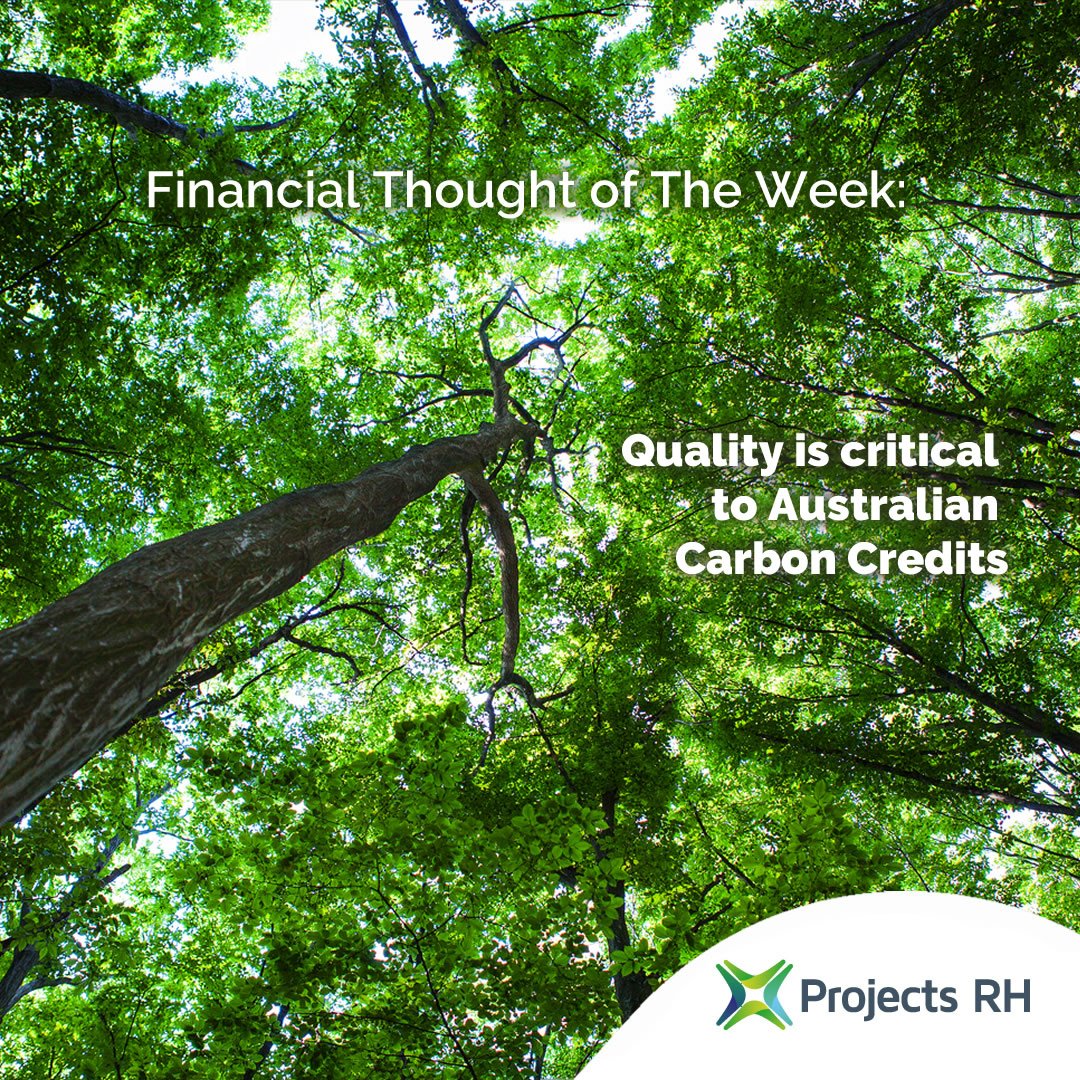Quality carbon credits are important to make AU Carbon Credits competitive. But quality that withstands scrutiny.
they need to stand up to scrutiny to be competitive. To get international credibility we need to clean our house first!
Increasingly over the last few months, our clients have been asking our own views on their needs to have carbon credits as part of what they do, and critically in their submissions to company and government supply panels.
Many have prepared detailed understandings of their carbon footprint but now believe they need to show more than their own movement towards reducing it, and that they need to show they are buying carbon offsets. They recognise that these can be purchased for some of their activities domestically and for others internationally.
Other of our clients are concerned that they supply internationally and is only a matter of time, unless they can show that they have achieved carbon neutrality in how and what they produce, that they will be penalised or excluded from markets particularly Europe.
In Europe, and elsewhere, there is a clear view that if companies compete, they need to compete on equal grounds and carbon neutrality is now one of these. If importers select goods which do not come from a like carbon treatment environment, they are likely to be subject to import duty whatever it is called.
In each of these situations, quality carbon credits are important. We say quality because they need to stand up to scrutiny. Historically, several parties said they had purchased carbon offsets and they were found to be of dubious value. In Europe in particular, companies have been held out to public ridicule when their behaviour has not reached community expectations with respect to reducing their carbon footprint and some companies have been directed to reduce their carbon footprint by European authorities.
The Carbon pillar
The Carbon market is a major pillar in the ESG world which is dominating the thinking of corporate Australia. Projects RH’s clients know that they must move with the times and provide carbon offsets for what they do. Those in Australia need to buy those credits for sales in Australia from the local Carbon market and can buy carbon credits for their international operations and sales from the voluntary natural carbon credit market.
This week our clients have been most distressed that the value of their carbon credits has been challenged by the technical experts themselves. Some of these experts were not only responsible for setting the rules before enforcing them.
Carbon emissions risk is real. Commercially our clients need to show that they are moving towards carbon neutrality and when they cannot, that they are purchasing carbon credits. Locally they have no choice but to buy Australian Carbon Credit Units which are issued by The Clean Energy Regulator (CER) using methods approved by the Emissions Reduction Assurance Committee (ERAC) both bodies are controlled by Minister Angus Taylor.[1]
Reputation over price
We live in a world where trade is a very essence of what we do, and reputation as become more important than price in winning global contracts. This week we have seen two major announcements from Santos – an Australian based gas and oil exporter. First, they have pledged that they will not make sales to companies who are not committed to the same environmental values as they are – in summary that they too are moving to 0 carbon emissions basis[2]. Second, that they are investing in carbon sequestration at the cost of USD 24 tonne in the belief that this is a sensible business decision, and investment of capital as they need to generate their own carbon credits[3]. Critical background to this is that Santos has two oil and gas projects price at USD 3.7 billion and USD 2.7 billion respectively.
COP26 has given practicality to section 6 of the Paris Accord communicate. At COP 26 a new international body was established to create standards for carbon credits, and importantly for the market, its pronouncements will be recognised by the International Accounting Standards Board – in short accountants will have to follow and apply them.
In the US the Securities and Exchange Commission (SEC) has issued draft rules which ensure that companies report on three levels of carbon emissions.
Companies need to report Scope 1, 2 and 3 emissions where
Scope 1 – All Direct Emissions from the activities of an organisation or under their control. Including fuel combustion on site such as gas boilers, fleet vehicles and air-conditioning leaks.
Scope 2 – Indirect Emissions from electricity purchased and used by the organisation. Emissions are created during the production of the energy and eventually used by the organisation.
Scope 3 – All Other Indirect Emissions from activities of the organisation, occurring from sources that they do not own or control. These are usually the greatest share of the carbon footprint, covering emissions associated with business travel, procurement, waste, and water.
This will encourage more research in the development of processes by the major accounting and consulting firms, not only as they prepare the independent reports that they need to review in line with the duties as auditors to ensure that they comply with accounting standards.
There is already clear action by major international companies and the purchases of Australia’s mineral and energy resources as they ask for carbon credits with their orders. We are also seeing leading Australian companies, such as Qantas, seize the opportunity and commit to it clean green future. Such companies need to ensure that they are meeting their obligations and will not be challenged by the ACCC, ASIC or green groups attending their AGMs.
Conclusion
An independent audit needs to happen[4].
The high standard provided in the international market by Verra and Goldstandard can provide the auditors with a template of what they should expect the Australian government supported authority to do.
Our clients need international credibility for what they do locally – we need clean our house first!
Minister Taylor needs to ensure that an independent review was undertaken locally of CER and ERAC.
Our clients are continuing to acquire ACCU credits and internationally focused on only credits registered by GoldStandand and Verra.
We must all focus on the ESG issues and ensure that the companies we work with receive the best of advice and make their contribution to a better world.
Until next time!
Paul Raftery
CEO, Projects RH, based in Sydney.
6th April, 2022
—————————————————————-
[1] Durie, J.; Carbon Review Welcomed, The Weekend Australian, 2-3 April, 2022, p. 36. https://www.theaustralian.com.au
[2] Packham, C.; Santos promises no sales without a net zero pledge – Financial Review, 3/31/2022. https://todayspaper.smedia.com.au
[3] Packham, C.; Santos sees carbon credits as lucrative earner – Financial Review, 4/1/2022. https://todayspaper.smedia.com.au
[4] See :Dean, L.; Carbon credit market can be revived: auditor – Financial Review, 3/30/2022 https://todayspaper.smedia.com.au




